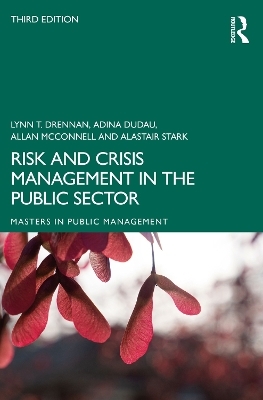
Risk and Crisis Management in the Public Sector
Routledge (Verlag)
978-1-032-43472-8 (ISBN)
This fully updated new edition explores the cutting edge of risk and crisis management scholarship, provides an extensive series of tools and practical guidance for public managers who deal with uncertainty and draws on a wealth of classic and contemporary case studies. This content equips readers and public managers with the knowledge and skills to understand key issues and debates, as well as the capacity to treat risks and better prepare for, respond to and recover from crisis episodes.
This book is essential reading for students studying public management, risk management and crisis management as well as professionals in the public management sector.
Lynn T. Drennan is Former Education Programme Director at the Institute of Risk Management, UK. Adina Dudau is Professor of Public Management at the University of Glasgow, UK. Allan McConnell is Emeritus Professor of Public Policy at the University of Sydney, Australia. Alastair Stark is Associate Professor in Public Policy at the University of Queensland, Australia.
Figures, Tables, Boxes and Cases xii
Acknowledgements for the third edition xiv
Preface xv
Abbreviations xx
1 Risk and crisis: definitions, debates and consequences 1
Risk as probability, threat and opportunity 2
Strategic and operational risks 4
Public sector risk 8
The development of risk management 10
Defining crises: schools of thought 11
Understanding the plethora of crisis definitions 16
The crisis management cycle 28
Conclusion 30
Discussion questions 31
2 Risk and crisis management: drivers and barriers 35
Adopting a systematic approach to risk and crises 36
Justifying risk and crisis management 38
Environmental drivers 42
Barriers to effective risk and crisis management 49
Understanding the causes of crises 51
Identifying crises before they arrive 56
Conclusion 59
Discussion questions 60
3 Risk identification and assessment 66
Risk identification 67
Risk assessment 71
Risk management capacity 74
Risk to whom? 77
Objectivist and subjectivist risk assessment 78
The precautionary principle 79
Risk management and ethics: guiding principles and rules 81
Conclusion 83
Discussion questions 84
4 Risk response and risk communication 89
Key terms 90
Risk response 90
Risk communication 97
The role of trust 100
Risk and learning in the resilient organization 103
Conclusion 105
Discussion questions 105
5 Contingency planning and crisis preparedness 110
Key terms 111
Planning and preparedness: a primer 111
A cycle of preparedness 112
Stage one: assessing capabilities 114
Ideal planning vs. public sector reality 133
Case study 5.1: fantasy documents and the queensland floods 135
Conclusion 140
Discussion questions 140
6 Managing the acute phase of crisis: adapting to uncertainty 145
Key terms 146
Acute crisis management: elementary issues 146
Functions and response patterns 148
Influences on the acute stage of crisis management 166
Conclusion 174
Discussion questions 174
7 After the crisis: evaluation, learning and accountability 178
Key terms 179
Post-crisis evaluation: learning and accountability in context 179
The challenge of evaluation: what constitutes a successful crisis response? 181
Post-crisis policy reform and learning 187
Accountability and blame games 192
Factors influencing the crisis aftermath 197
Conclusion 202
Discussion questions 203
8 Risk and crisis management in a global world 208
Key terms 209
The paradox of globalization 209
Emerging global risks 210
Growing risks 212
Interval risks 218
Speculative risks 219
Humanitarian crisis management 220
Remote crisis management 225
Transboundary crisis management 229
Conclusion 231
Discussion questions 232
Conclusion 236
Case study one: lesson learning in the shadow of the pandemic 239
The ‘what’ of pandemic lesson-learning 239
The ‘how’ of pandemic lesson-learning 242
Conclusion 243
Case study two: cyberattacks and personal data breaches 245
Managing cybersecurity risks 246
Managing ‘successful’ hacks 247
Conclusion 248
Case study three: wildfires 250
Greece 251
USA 252
Australia 254
Conclusion: the need for better risk communication 256
Index 259
| Erscheinungsdatum | 10.07.2024 |
|---|---|
| Reihe/Serie | Routledge Masters in Public Management |
| Zusatzinfo | 2 Tables, black and white; 3 Line drawings, black and white; 3 Illustrations, black and white |
| Verlagsort | London |
| Sprache | englisch |
| Maße | 156 x 234 mm |
| Gewicht | 540 g |
| Themenwelt | Sozialwissenschaften ► Politik / Verwaltung ► Staat / Verwaltung |
| Wirtschaft ► Betriebswirtschaft / Management ► Planung / Organisation | |
| Wirtschaft ► Volkswirtschaftslehre | |
| ISBN-10 | 1-032-43472-4 / 1032434724 |
| ISBN-13 | 978-1-032-43472-8 / 9781032434728 |
| Zustand | Neuware |
| Haben Sie eine Frage zum Produkt? |
aus dem Bereich


